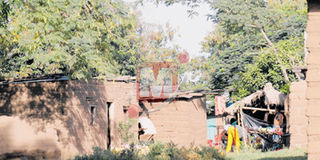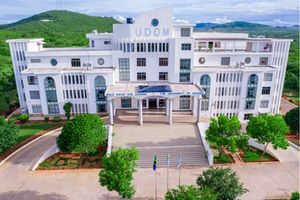Gambosi: Remote, promising village

A Section of Gambosi Village in Bariadi District, Simiyu Region. The remote village is now set for new changes that will transform people’s lives there. PHOTO | MICHAEL JAMESON
What you need to know:
- Gambosh, as outsiders call it, but the name appearing on signboards being Gambosi, is located some 60 kilometres from Bariadi Town.
Bariadi. On March 13, I travelled to Gambosi Village, Bariadi District in Simiyu Region in the company of four colleagues. Word had it that the village was among the most feared over claims of witchcraft practices.
Gambosh, as outsiders call it, but the name appearing on signboards being Gambosi, is located some 60 kilometres from Bariadi Town.
The team included Mwananchi Communications Limited (MCL) Simiyu Region correspondent Faustine Fabian, photographer Michael Jameson, the then Lake Zone manager Jackson Ngassa and one more person.
Ngassa was behind the wheel. It took us slightly over an hour to get to the village. We met the spiritual and traditional healer Chief Malosha Kafungile at Gambosi Primary School. He ordered us to place our working equipment on a tiny table. Unsure of what really that meant, we surrendered all our items including cameras, pens, voice recorders and notebooks.
Chief Malosha went around the table sprinkling some liquid on the items as a sign of blessing.
He was singing in Sukuma as he performed the ritual. He also sprinkled us with some colorless liquid, that I presumed to be water. “You’re now safe. You can as well carry on with your assignment,” he said after his ritual.
Is Gambosi home to witches?
This was my first question to Chief Kufungule. “No. We’re not witches. What you hear about us are mere rumors. We only respect, protect and follow our traditions and cultures,” he answered politely as those around us nodded in agreement.
However, the 34-year-old Chief, who is a husband of 3 wives and a father of eight children insisted that traditional healing remained the number one cure at the village.
“Our herbs are meant for curing ailments that cause sufferings to the people. We also use medicine to protect ourselves from bad people,” he said.
“We don’t chase away visitors but when they harbour ill-intentions against our people, we have powers to deal with them,” he said.
For his part, Gambosi Ward executive officer Mathew Shini said the village was well known outside as the home of sorcery and superstitious beliefs.
“These are mere rumours. There’s nothing extraordinary here,” he said.
The origin of the name Gambosi stems from an ancestor who was known by the name. “The name Gambosi originates from a great hunter who used to live here many years back. He could protect himself from his enemies and wild animals by using traditional herbs,” narrated Chief Kufungile.
“That is how the name Gambosi started,” said the chief showing us the said grave of the founder. In the middle of the grave, there stood a large tree, known as Mwicha, in Sukuma.
According to Chief Kufungile, residents respect and conserve the environment, not only around Gambosi’s grave, but around the entire village. “There are trees which cannot be felled without a good reason. People are only allowed to pick dropped leaves but not to cut down the trees,” he said.
According to him, the Mwacha tree on the grave is used for special occasions including praying for rain, offering sacrifices, while its leaves are used to boost blood levels of babies and pregnant women.
“This is the reason you see that we’ve managed to conserve natural vegetation cover around here. This is not the same as in many other parts of Simiyu Region,” said the Chief. For his part, Kisanduku Hoja, 57, says after the death of Gambosi, there came other notable leaders, men and women. He mentioned a woman who was known as Mwanamisana, who became so famous immediately after the death of Gambosi in the early 1960s.
Then, there followed Samike, who came from Shinyanga Region, and won the spiritual battle against Gambosi residents.
Chief Kafungule is the grandson to Burunguti, a traditional healer who was famous for curing people of their ailments.
Social life
Mbina is a special dance especially during the harvesting period meant to thank the ancestors for bounty food harvests. During the Mbina dance various gifts are offered to the elders as a sign of appreciation to the ancestors.
Villagers also have the tendency of praying for rain as they are growers of mainly maize and cotton. “We’ve never experienced food shortage due to famine,” said Chief Kufungile.
Getting a wife
A man who intends to find a wife in Gambosi Village must prepare to part with 15 to 20 heads of cattle.
An elder, Maduhu Shija, 88, said one had to be a hard worker to find a wife.
If a man does not pay the dowry, he risks losing his wife and children, who would be retaken by his in-laws.
Identifying married women
It is the way women wrap their khangas that differentiates married from single women. So, a man must watch this if he is looking for a partner.
Ng’wkami Masalu, 75, a mother of twelve children, said a married woman wraps herself in two khangas, one by the waist and another around the armpits. Anyone who tries to approach a married woman risks being fined up to Sh600,000 or subjected to a canning or both.
External influence
Since independence, the only national leader to have ever visited Gambosi was Mwalimu Julius Nyerere.
The other leaders in recent times, according to area Councilor Kaliwa Bahame, are Simiyu Regional Commissioner Antony Mtaka and Bariadi District Commissioner Festo Kiswaga.
“Many past leaders tended to shy away from the village, perhaps due to the witchcraft rumors,” said the Councilor.
Gambosi offering opportunities
Speaking at different occasions, Simiyu RC Mtaka and Regional Administrative Secretary Jumanne Sagini revealed big development plans for Gambosi Village.
“We want to use the village as a tourist attraction. For example, we want to encourage culture tourism here,” said Mtaka.
For his part, Sagini promises that his office will assist any institution or individual interested in using the area’s history as an opportunity to contribute positively to development of the people.
“Gambosi is an ideal place for cultural studies and traditional medicines the Muhimbili University of Medicine should fully utilise,” says Sagini.
He thanked MCL for its efforts to highlight even remote areas like Gambosi.
Community development
Gambosi Village is connected to electricity through Rural Energy Agency (REA) projects, and hosts a school and a health facility.
Gambosi Village executive officer Chalo Charles says the area has reliable safe and clean water.
While Gambosi Primary School has over 1,100 pupils and 20 teachers, a secondary school is under construction.
Mathias Sumuni, head teacher at the school, emphasizes importance of education in bringing about changes.
“This year, we enrolled 220 Standard One pupils; things are changing,” he says.
“It is people in other parts who spread the misconception that there is witchcraft here,” he says.
The main challenge facing the village is lack of road. People follow livestock trails to get to nearby villages.
Maduhu Nsangi urged leaders and government officials to sort out the problem.
Church services
Denominations that have penetrated to this village include the Roman Catholic Church, Seventh Day Adventist (SDA), Evangelical Lutheran Church in Tanzania (ELCT), African Inland Church of Tanzania (AICT) and Living Water.
“It was not easy when we started spreading the Gospel here (Gambosi). This is because many villagers believed and held traditional religions,” says Living Water Church Evangelist Emmanul Kalwari.
According to the area Councilor, Gambosi is the home village of SDA leader Archbishop Mark Malekana.
Gambosi Ward executive officer Shini is optimistic positive change is coming to Gambosi Village.




